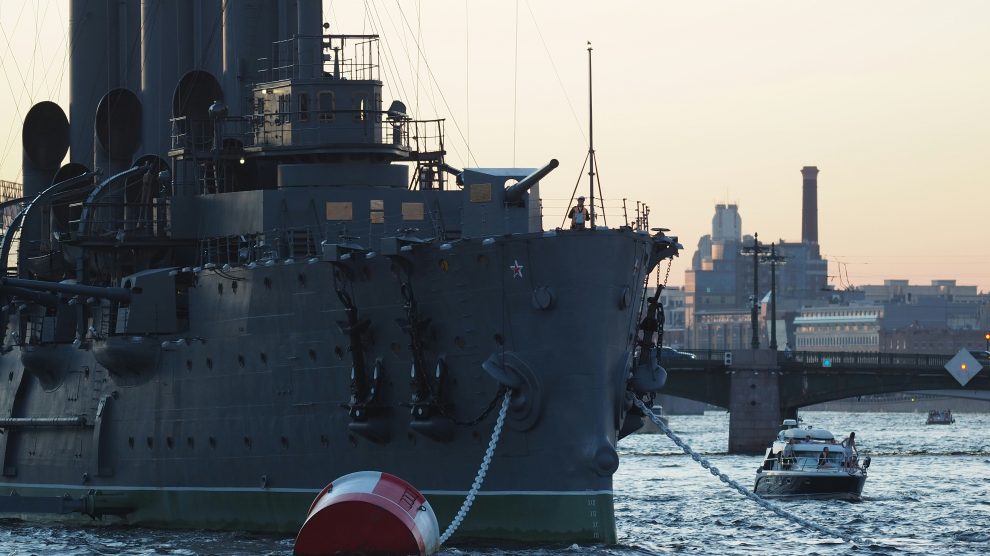The first significant Russian strategic defeat as a direct consequence of its full-scale invasion of Ukraine is the loss of its Mediterranean outpost.
Vladimir Putin’s obsession with Ukraine has led Russia to channel virtually all its military forces and resources into the Ukrainian conflict.
Regardless of the war’s eventual outcome, it is hard to argue that the invasion has gone as Putin planned. Russia has suffered massive losses, stretching its military thin and making it increasingly difficult to defend the country’s geopolitical interests elsewhere.
- Ukraine’s economy, like its people, resists
- Why the EU should drastically increase aid to Ukraine
- Rethinking the fight against disinformation in the Black Sea region
Not only has the Kremlin pulled its military forces from vast stretches of Russia’s enormous territory and thrown them into the Ukrainian meat and metal grinder, but Moscow has also neglected other areas where the country has crucial strategic interests, especially Assad’s Syria. Given recent dramatic military events there, it can be argued that the fatal fate of Russia’s historic satellite state is directly linked to the Kremlin’s military adventure in Ukraine.
With the collapse of the Assad regime, Russia’s military foothold in Syria will vanish, with significant geopolitical consequences for the Kremlin. Particularly critical is the loss of Russia’s geostrategic maritime foothold in the eastern Mediterranean—a development with geopolitical ramifications far beyond the immediate geographical region.
Blitz offensive
The rebels’ blitz offensive against the Syrian Army over the past two weeks led to the Assad regime’s collapse much faster than any Syria expert could have predicted. To the surprise of most observers, the rebels even entered the provinces of Latakia and Tartus in the Alawite heartland, facing minimal resistance.
Russia’s main military bases in Syria are located in these provinces, making them natural targets. The jihadists have repeatedly made it clear that Russia is their sworn enemy, so there is no reason to believe these bases will be spared in the future, regardless of all the rumors of the opposite circling around.
Russia might be allowed to evacuate its military personnel in the very short-term, but its strategic foothold in the Eastern Mediterranean will be untenable moving forward.
Particularly important is the loss of Russia’s long-standing strategic naval base in the coastal city of Tartus, established during the Soviet era in 1971. Without Tartus, Russia loses its only maritime logistical hub in the Mediterranean, severely impacting the Kremlin’s power projection capabilities in the greater Middle East and the African continent.
A critical maritime geostrategic hub
The Russian naval base in Tartus has long served as a key logistical support point for the Russian Navy in the Mediterranean. Russian ships could resupply and undergo maintenance there without returning to bases in the Black Sea.
However, given the war in Ukraine and recent geopolitical developments, the naval base in Tartus has become more geostrategically crucial than ever for the Kremlin. Not only is the Black Sea not safe for the Russian Navy in face of Ukrainian maritime drones, but Russian warships no longer have access to their Black Sea bases. Turkey has invoked the Montreux Convention of 1936, which grants Ankara the right to deny warships passage through the Bosphorus Strait in case of war between Black Sea coastal states.
Thus, the Tartus naval base has become essential for maintaining Russia’s naval presence in the Mediterranean, providing the only location for extended maritime operations. The Russian Navy has enjoyed reliable and unrestricted access to dry docks, a ship repair hall, and refueling infrastructure there.
Without access to its long-standing naval base in Syria and with the Bosphorus Strait closed, Russia’s ability to sustain its military-maritime presence in the Mediterranean is under severe pressure. Warships require access to such ports not only for supplies but also for regular maintenance. Without this, it seems almost impossible for Russia to maintain a long-term naval presence in the Mediterranean.
The bigger picture
But the implications extend further. Russia’s base facilities in Latakia and Tartus also play a critical role in supporting the Kremlin’s strategic interests far beyond the eastern Mediterranean and the Middle East. These bases not only provide Russia with crucial access to the entire Mediterranean but also serve as vital logistical hubs for Russian military-commercial activities in North Africa, the Sahel, and sub-Saharan Africa.
The bases facilitate transporting personnel, equipment, and supplies to countries where Russian forces and affiliated groups like the Wagner Group operate. This support is essential for sustaining Russian military operations in countries such as Libya, the Central African Republic (CAR), Mali, and Sudan, where Russian military presence has been significant.
Without these bases, the Kremlin’s power projection capabilities across the African continent—where it has made significant geopolitical inroads at the expense of Western powers in recent years—will suffer greatly. It is far from certain that Russia can continue its Wagner-led resource extraction projects, military junta support efforts, and other military ventures in Africa on the same scale as before.
Could Russia have kept the Assad regime in power if the war in Ukraine had not occurred? This is, of course, speculative, but much suggests that the Russian armed forces would have had the capacity to do so if they had not tied up enormous resources in Ukraine. Therefore, the situation can be considered a significant strategic defeat for the Kremlin, as a direct consequence of the invasion of Ukraine.
Photo by Alekhin Sasha on Unsplash.
At Emerging Europe, we use an integrated approach centred around market intelligence to help organisations understand trends and strategically position themselves for success.
Learn how our solutions can help you thrive in the region:
Company and Services Overview | Strategic Advantage.

